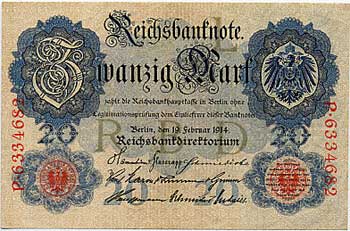War guilt, reparations and the 1.00 (U.S. $) = 4.200 000 000 000 Reichsmark
By Robert A. Selig
That’s 4 trillion 200 billion Reichsmark to 1.00 (U.S. $), give or take a few a few hundred million or billion depending on what time of day it was. Either way, a century ago in November 1923, you probably would have had a difficult time finding a merchant who would have accepted your briefcase full of billions/trillions of Papiermark as payment for a loaf of bread, a pound of meat, or a dozen eggs.
Five years after the end of World War I, financial, economic, and political chaos ruled in a defeated Germany. French and British troops occupied the Rhineland since 1 December 1919, France set up a new government in the Saar in February 1920, and French and Belgian troops had marched into the Ruhr to enforce German compliance with reparations on 11 January 1923. Just like during the winter of 1918/19, the disintegration of the Fatherland into Bolshevist-run Soviet Republics seemed ante portas. It was commonly accepted that the culprits on the one hand were the government in Weimar dominated by the “November Criminals”, the men who had chased the monarchs of Germany off their thrones in November 1918 and brought about the defeat in the war. They conveniently forgot that the real enemy to the young German democracy stood on the far right of the political spectrum. On 8–9 November 1923, Adolf Hitler and the Nazi Party attempted a government takeover in Munich, but the so-called Beer Hall Putsch failed. The second set of culprits were vengeful politicians in the Elysée Palace in Paris, in 10 Downing Street in London, and to a lesser degree in the White House in Washington, D.C. In the Treaty of Versailles of June 1919, the victors had declared Germany guilty of unleashing the war onto the world in 1914 and were now using reparations and hyperinflation to destroy and impoverish the German nation for decades to come. All but a small minority of Germans believed this explanation of the chaos around them. Germany had not started the war. She had done her utmost to meet her obligations, but the victors’ boundless greed was insatiable. But was that web of anti-German conspiracy true?
To read more subscribe now! Click here!


